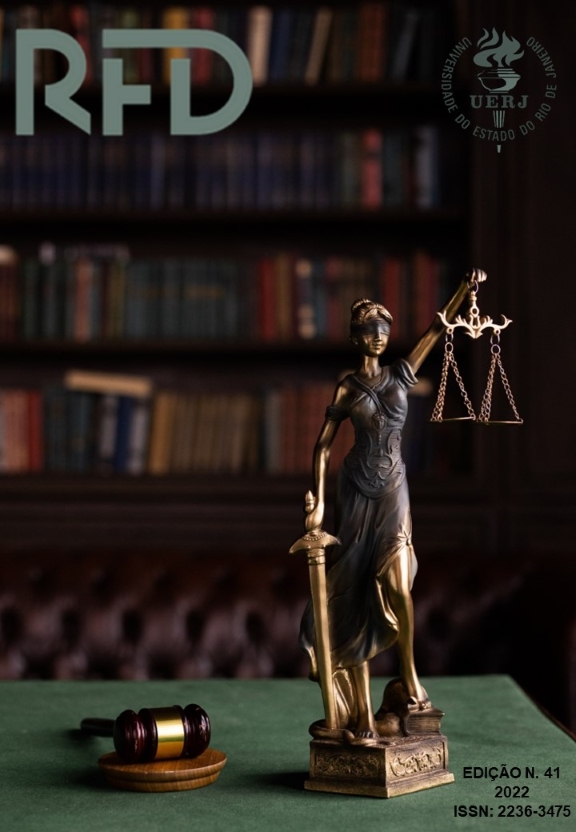O TRATAMENTO DIFERENCIADO DAS MICROEMPRESAS E EMPRESAS DE PEQUENO PORTE NO BRASIL E AS TENDÊNCIAS LAW AND ECONOMICS / THE DIFFERENTIATED TREATMENT OF MICRO ENTERPRISES AND SMALL COMPANIES IN BRAZIL WITHIN THE PERCEPTION OF LAW AND ECONOMICS
DOI:
https://doi.org/10.12957/rfd.2022.51711Keywords:
Microempresa. Empresa de Pequeno Porte. Tratamento Diferenciado. Neoliberalismo. Law and Economics.Abstract
Resumo: Tradicionalmente, o cenário global requer uma preocupação com o sistema econômico, que é a engrenagem transformadora das questões sociais e financeira de um país. Neste sentido, o Estado, com a necessidade de enfrentamento de crises, escassez de empregos e fomento ao desenvolvimento empresarial, passou a amparar as Microempresas (ME’s) e Empresas de Pequeno Porte (EPP’s) com tratamento diferenciado multidisciplinar. Assim, o presente artigo objetiva estudar o panorama dessas benesses, vislumbrando associar a previsão constitucional e legal dentro da ordem econômica brasileira, analisando quais os requisitos para o enquadramento empresarial, os benefícios fiscais, administrativos, trabalhistas e, ainda, estímulos de crédito e inovação. Sincronicamente, guia-se o tema dentro da Law And Economics, para melhor compreensão dos impactos econômicos e as tendências da política pública atual sobre a matéria, abrangendo a influência da Lei da Liberdade Econômica aos pequenos empreendedores, com o fim de garantir a livre iniciativa, a concorrência, a igualdade e a evolução do mercado. A metodologia de análise é predominantemente dedutiva, descrevendo e interpretando as regras constitucional e legal dos benefícios expostos, com objetivo de compreender o panorama brasileiro de tratamento diferenciado às pequenas empresas, sem deixar de lado o método dialógico, trazendo as vertentes de outras disciplinas, como a Economia, para a construção de um estudo interdisciplinar.
Palavras-chave: Microempresa; Empresa de Pequeno Porte; Tratamento Diferenciado; Law and Economics.
Abstract: Traditionally, the global scenario requires a concern with the economic system, which is the transforming gear of a country's social and financial issues. In this sense, the State, with the need to face crises, scarcity of jobs and foster business development, started to support Microenterprises (ME’s) and Small Companies (EPP’s) with differentiated multidisciplinary treatment. Thus, this article aims to study the panorama of these benefits, aiming to associate the constitutional and legal provision within the Brazilian economic order, analyzing what are the requirements for the business environment, the tax, administrative, labor benefits and, still, credit and innovation stimuli. Synchronously, the theme is guided within Law And Economics, to better understand the economic impacts and current public policy trends on the matter, covering the influence of the Economic Freedom Law on small entrepreneurs, in order to guarantee free initiative, competition, equality and market developments. The analysis methodology is predominantly deductive, describing and interpreting the constitutional and legal rules of the benefits exposed, in order to understand the Brazilian panorama of different treatment for small companies, without leaving aside the dialogical method, bringing the strands of other disciplines, such as Economics, for the construction of an interdisciplinary study.
Keywords: Micro enterprise; Small business; Differential Treatment; Law and Economics.
Downloads
Published
How to Cite
Issue
Section
License
Copyright
oArticles published in the Revista da Faculdade de Direito da UERJ (RFD/UERJ)
The copyrights of the published articles belong to the Revista da Faculdade de Direito da UERJ (RFD/UERJ). Total or partial reproduction of the articles is allowed as long as the source is cited.
oPartial reproduction from other publications
Submitted papers that contain parts of text extracted from other publications must obey the specified limits to ensure originality of the submitted work. Plagiarism in all its forms constitutes unethical behavior and is unacceptable.
It is recommended to avoid reproduction of tables and illustrations from other publications. The article that contains reproduction of one or more tables and/or illustrations from other publications will only be sent for analysis if it is accompanied by written permission from the copyright holder of the original work for the specified reproduction in the Revista da Faculdade de Direito da UERJ (RFD/UERJ). The permission must be addressed to the author of the submitted work. Under no circumstances will the Journal of the Law School of the State University of Rio de Janeiro (RFD/UERJ) and the authors of the papers published in this journal transfer the rights thus obtained.
•The refused studies will be returned to the authors, if asked.

The Revista da Faculdade de Direito is licensed under a Creative Commons Atribuição 4.0 Internacional License.
This work is licensed under a Creative Commons 4.0 Attribution-No Derivation License.
This license allows copying and redistribution of the material in any medium or format for any purpose, even commercial, provided that the original authorship is acknowledged.










